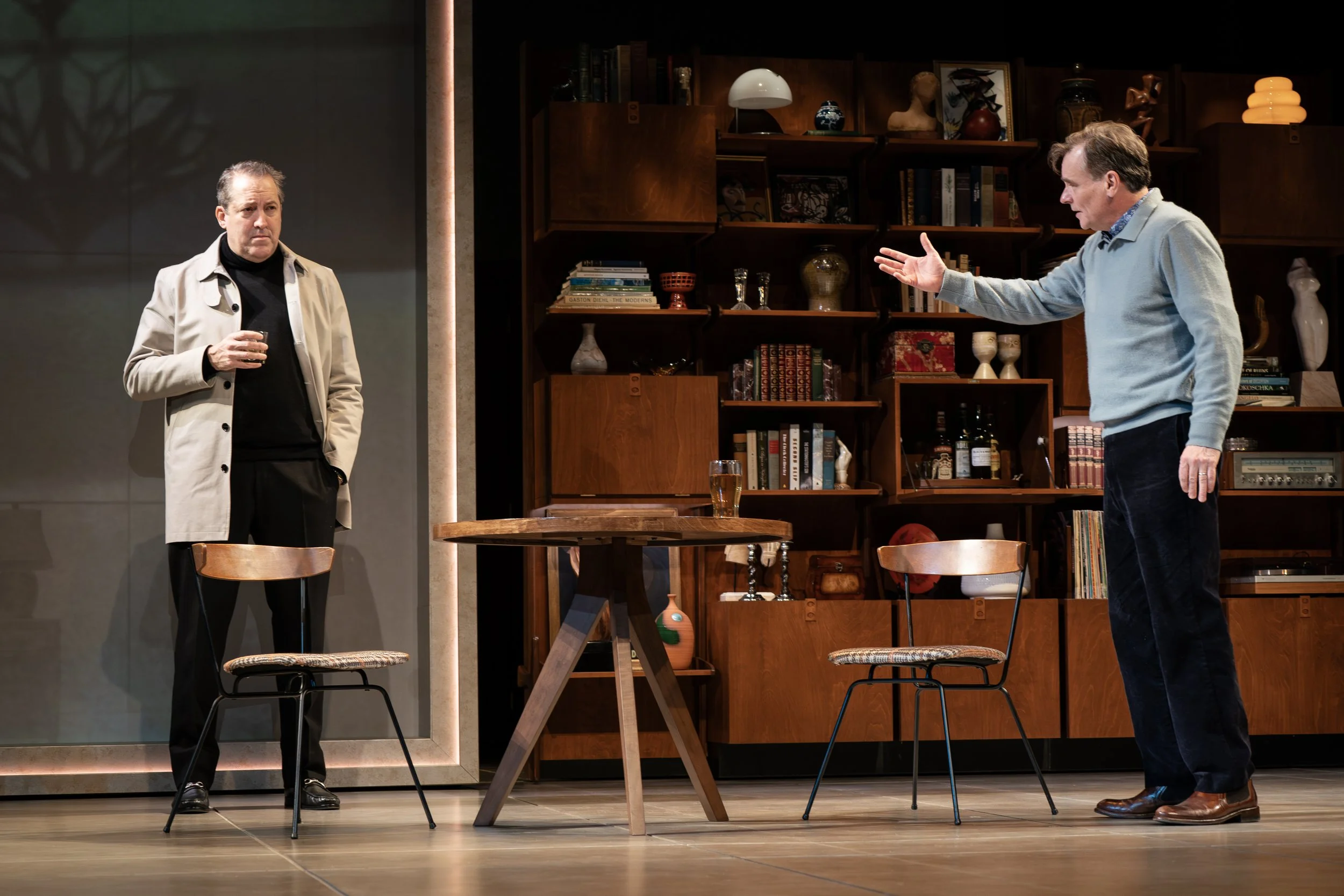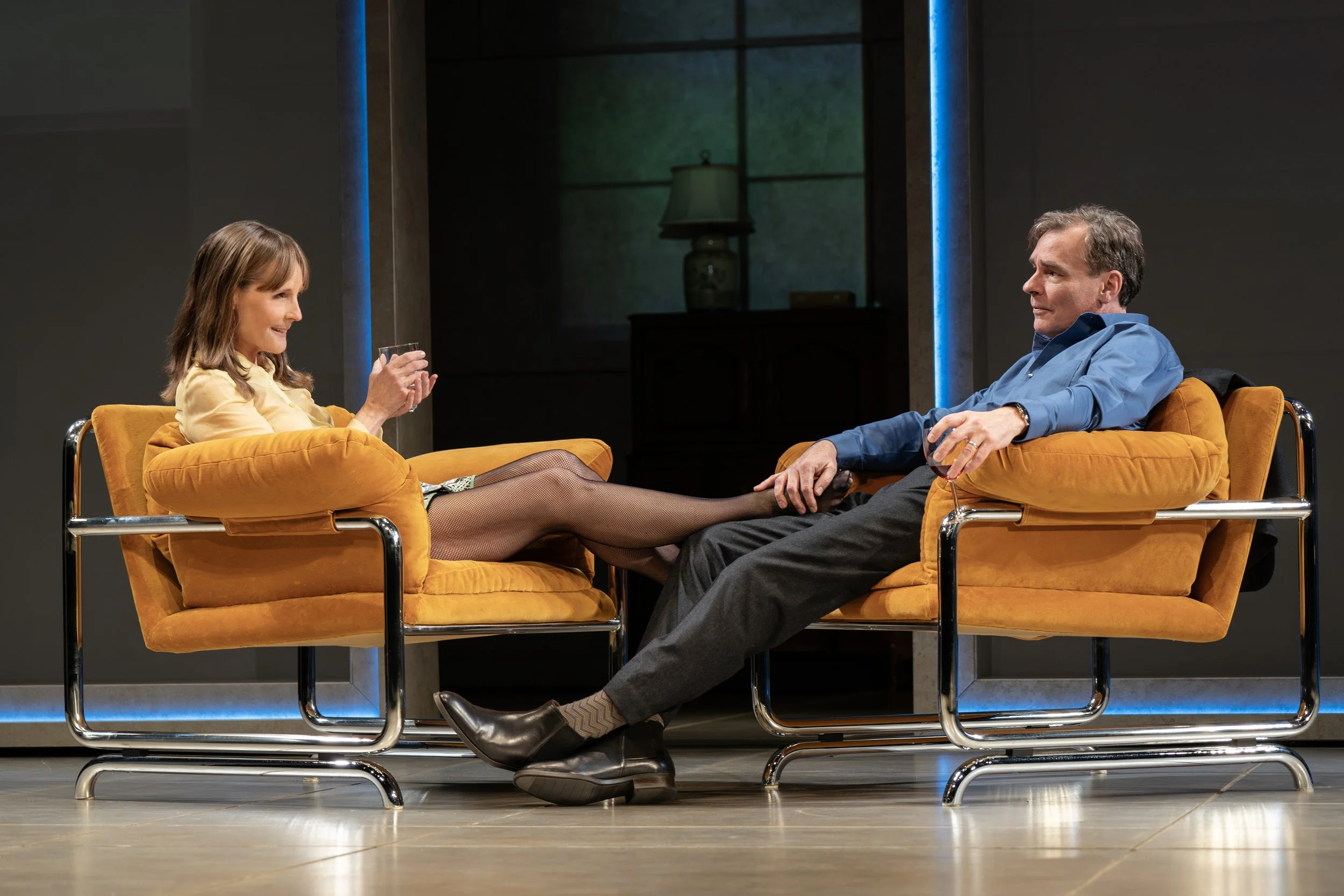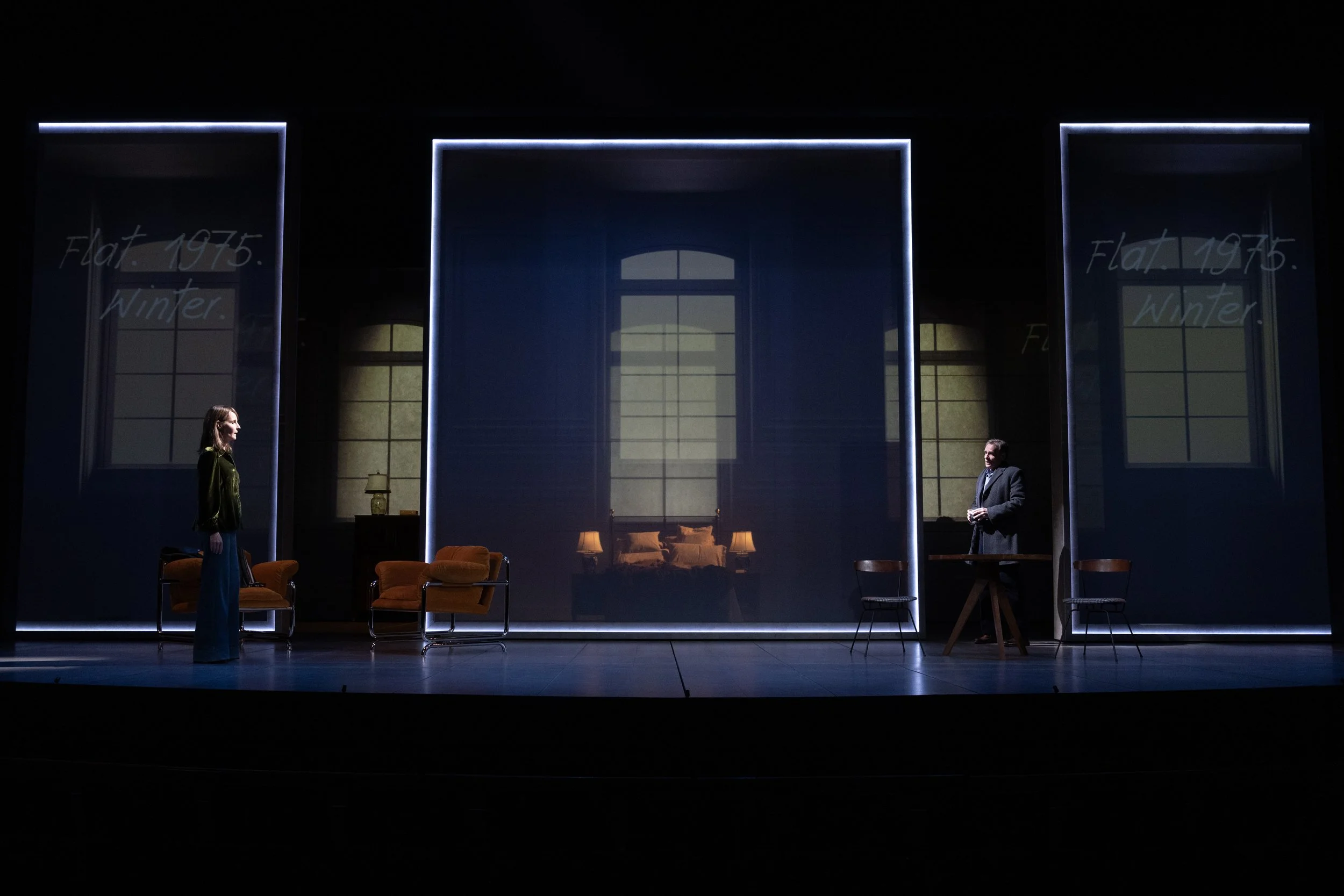Goodman Theatre: Betrayal Review
Ian Barford and Robert Sean Leonard
Goodman Theatre Presents BETRAYAL Review - Subtlety Is The Name Of The Game
TLDR: Framed with nostalgic black and white images and orchestrations evoking reminiscence, Betrayal dives into the relationships between a man and his wife having an affair with his best friend. Though about relationships and connection, Goodman’s production doesn’t hit emotionally for this writer.
Robert Sean Leonard, Ian Barford, and Helen Hunt
Let’s Get to The Heart of The Matter at Goodman
Harold Pinter likes to look at relationships. Here in Betrayal we start at the end of an affair. Five years after it started while both married to different people, Emma and Jerry meet up for a drink. We’re taken back through time seeing pivotal moments in their relationship and theirs with Emma’s husband and Jerry’s best friend, Robert.
Pinter's words are sparse and keep things surface level, so it all comes down to delivery. Here in Goodman’s production the three actors show how their relationships change as they go scene by scene traveling back almost ten years ago.
Jerry and Emma, played by Robert Sean Leonard and Helen Hunt respectively, meet up at a pub in 1977 and have a stilted and awkward conversation. Jerry keeps sipping from his beer. He shifts in his seat seemingly unable to get comfortable. He leans back, almost trying to put distance between himself and Emma. But in their shared flat years ago, he pushes their living room chairs closer together, pulls her feet in his lap, wanting her close.
We see the distinctive moments Ian Barford playing Robert chooses to let his emotions loose. He laces his words with underlying malice as he dresses in his and Emma's hotel room in Venice in 1973. Likewise at lunch with Jerry, though they go through their usual catch-up pleasantries and the running joke maybe they'll play squash one of these days, Robert drinks glass after glass of wine seething across from Jerry. But at the beginning of the show in 1977, he’s cool as a cucumber, almost bored and pitying Jerry as Jerry awkwardly stumbles through a conversation after finding out Robert knows.
And Emma seems to grow weary through the years. She hunches over at the table when she meets up with Jerry at the pub, her purse in her hands stuck deciding if she should stay or leave. But we’ve seen her in the past in 1971, she was once lively and barefoot in the kitchen happily cooking up a stew. She's searching for something and thought perhaps she had it once, but maybe now she can find it again. But the disappointment weighs her down later in life.
Helen Hunt and Robert Sean Leonard
Simple Yet Effective Framing
Entering the Albert theater, large screen frames sit three deep on the stage, creating this stacked effect. Betrayal in script font is projected on the first one and echoes on the three behind it as it fades into the distance. These giant frames light up around the border and slide on and off stage as we switch from scene to scene. As we begin a new scene, scrolling text gives us the place, the year, and the season as we move backwards through the years.
The set itself is minimal, but there are subtle accents to the time period. Orange living room chairs with shiny metal frames scream 70s. The minimal set also helps heighten moments. They mention this Venetian tablecloth many times and when Emma finally pulls it out of her bag, it becomes a moment unto itself, standing out in all its lace glory.
The original score that plays during scene transitions evokes a sense of nostalgia and memories. Not quite cheerful, but not quite melancholic, just a sense of reflection or wanting to remember. During scene changes, black and white images of families, lovers, and vacations on the beach flash by while the music plays furthering this feeling of nostalgia and looking back on a lifetime.
Helen Hunt and Robert Sean Leonard
The After Party Thoughts
Pinter plays are not for those who don’t like shows that dive into complexities of relationships or who want more driving action. His plays are truly about stripping everything else away and focusing on how a relationship develops or breaks down. For me, it felt like that's where Betrayal stayed, stripped down to barebones and didn’t feel a deeper emotional connection.
There's hints of deeper intention behind Pinter's words and the way our actors physically portrayed them tried to help us along. And maybe that’s what we’re meant to take away, we’re meant to be left wondering why and go deeper ourselves. Maybe we’re just meant to be passive observers to this story, peering through the window frames.
Ultimately I liked the set design and what the actors did with the material to pull depth out of it (it was pretty cool to see these acclaimed actors show their chops on stage), but Betrayal still didn't have as much of an emotional impact as I would have expected from a play all about relationships. For those that might feel the same way and want more if a play is solely focused on relationships, this might not be a good fit for you. However, if you are a fan of Pinter, won’t mind the feeling, and also maybe just want to see some stars onstage, Betrayal would be a good fit for you.
SOMEWHAT RECOMMENDED
Helen Hunt and Ian Barford
When
Now through March 30, 2025
Where
Goodman Theatre
170 N. Dearborn St.
Chicago, IL 60601
Runtime: 115 minutes, no intermission
Tickets
$40+
Tickets can be purchased by calling the box office at (312) 443-3800 or through the Goodman Theatre website
Photos
Joan Marcus
Find Allie and The After Party featured on Theatre In Chicago
CAST
Ian Barford (Robert)
Nico Grelli (Waiter)
Helen Hunt (Emma)
Robert Sean Leonard (Jerry)
Understudies:
Cheyenne Casebier, Michael Milligan, and Jeff Parker
CREATIVE
Harold Pinter (Playwright)
Susan V. Booth (Director)
Neil Patel (Set Designer)
Linda Roethke (Costume Designer)
Xavier Pierce (Lighting Designer)
Rasean Davonté Johnson (Projection Designer)
Michael Bodeen and Rob Milburn (Sound Designers and Composers)




